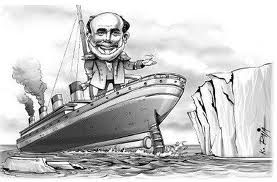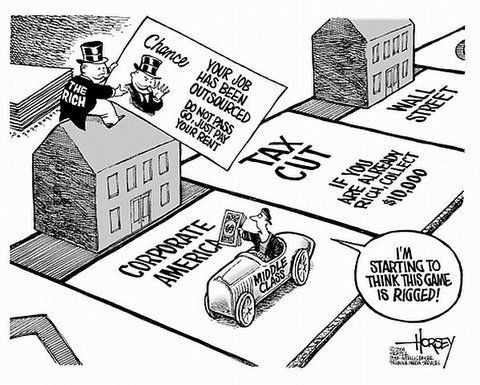Punting the Pundits” is an Open Thread. It is a selection of editorials and opinions from around the news medium and the internet blogs. The intent is to provide a forum for your reactions and opinions, not just to the opinions presented, but to what ever you find important.
Thanks to ek hornbeck, click on the link and you can access all the past “Punting the Pundits”.
Robert Sheer: The Bernanke Scandal: Full-Frontal Cluelessness

ow I wish that Ben Bernanke would get caught emailing photos of his underwear-clad groin. Otherwise we don’t stand a chance of reversing this administration’s economic policy, which is shaping up to be every bit as disastrous as that of its predecessor.
Indeed, the Fed chairman’s much anticipated remarks on Tuesday take one back to the contemptuous indifference of a Herbert Hoover to the public’s suffering: Bernanke dismissed the wobbly economy with its anemic 1.8 percent first-quarter growth as merely “somewhat slower than expected.” The rise in unemployment to 9.1 percent was “some loss of momentum.”
The problem with Bernanke is that he is utterly clueless as to the stark pain and fear endured by the 50 million Americans who have experienced, or face the prospect of, losing their homes. His remarks reflected the insularity of a ruling-power elite that is magnificently impervious to the damage that Bernanke’s policies in the current and past administration helped inflict on what used to be called the American way of life. This is a man who assured us there was no housing crisis, while his policies at the Fed encouraged the mortgage securitization swindles that caused the meltdown of the economy.
John Nichols: AFL’s Trumka on Pols Selling Out Workers: ‘I’ve Had a Snootful of This S**t!’
AFL-CIO President Richard Trumka sent his strongest signal yet about the labor movement’s frustration with the dysfunctional politics of the moment-where Republicans go to extremes on behalf of big banks and multinational corporations, Democrats compromise and working families are left out of the equation.
Speaking Tuesday to the National Nurses United conference in Washington, where more than one thousand nurses from across the country rallied to begin the push to replace the politics of setting for less with a unapologetic demands for a new economic agenda, Trumka found a plenty of takers for his agressively progressive message.
“We want an independent labor movement strong enough to return balance to our economy, fairness to our tax system, security to our families and moral and economic standing to our nation,” declared Trumka, who in recent months has been repositioning the AFL-CIO as a force that will hold Republicans and Democrats to what he describes as “a simple standard: “Are they helping or hurting working families?”
From Marmet to Blair, West Virginia, hundreds of activists are marching across the Appalachian region this week to honor the historic Battle of Blair Mountain of 1921. This event, designed to mark one of the biggest civil uprisings in the United States history and the largest armed insurrection since the American Civil War, however, is not just about history. Appalachia Rising and Friends of Blair Mountain are using the five-day march to protest the controversial practice of mountaintop removal coal mining.
Dave Roberts of Grist detailed well the brutality of mountaintop removal in a 2008 guest post at TheNation.com:
“Mountain ridges and peaks are clear-cut, stripped of all trees and other flora. Explosives are buried underground, and enormous blasts dislodge millions of tons of rock, dirt, soil, and animal and plant life. That ‘overburden’ is then carted away or dumped into the stream and creek beds in the mountain hollows below, destroying or polluting thousands of miles of running water. Huge 20-story-tall draglines pull away the rock to expose coal seams. Similarly huge machines then yank the coal out and dump the remaining waste down into those streams.”From Marmet to Blair, West Virginia, hundreds of activists are marching across the Appalachian region this week to honor the historic Battle of Blair Mountain of 1921. This event, designed to mark one of the biggest civil uprisings in the United States history and the largest armed insurrection since the American Civil War, however, is not just about history. Appalachia Rising and Friends of Blair Mountain are using the five-day march to protest the controversial practice of mountaintop removal coal mining.
Dave Roberts of Grist detailed well the brutality of mountaintop removal in a 2008 guest post at TheNation.com:
“Mountain ridges and peaks are clear-cut, stripped of all trees and other flora. Explosives are buried underground, and enormous blasts dislodge millions of tons of rock, dirt, soil, and animal and plant life. That ‘overburden’ is then carted away or dumped into the stream and creek beds in the mountain hollows below, destroying or polluting thousands of miles of running water. Huge 20-story-tall draglines pull away the rock to expose coal seams. Similarly huge machines then yank the coal out and dump the remaining waste down into those streams.”
Amy Goodman: Heeding the Warnings of Environmental Reveres
ef it feels.”
These two lines were written by Henry Wadsworth Longfellow in his poem “Snow-Flakes,” published in a volume in 1863 alongside his epic and better-known “The Midnight Ride of Paul Revere.” Much of the news chatter this week has been about Sarah Palin’s flubbing of the history of Revere’s famous ride in April 1775. Revere was on a late-night, clandestine mission to alert American revolutionaries of an impending British attack. Palin’s incorrect version had Revere loudly ringing a bell and shooting a gun on horseback as a warning to the British to back off.
Pathetically, as well, the media has been awash with New York Congressmember Anthony Weiner’s string of electronic sexual peccadillos. Punctuating the sensationalism, and between the TV commercials from the oil, gas, coal and nuclear industries, are story after story of extreme weather events. Herein lies the real scandal: Why aren’t the TV meteorologists, with each story, following the words “extreme weather” with another two, “climate change”? We need modern-day eco-Paul (or Paula) Revere to rouse the populace to this imminent threat.
Hanah Gurman: Bigger than Blackwater: Arming the UAE
The International Defense Exhibition, otherwise known as IDEX, has been held bi-annually in the United Arab Emirates (UAE) since 1993. It is the largest defense expo in the Middle East and North Africa and one of the biggest in the world. But far from being a one-off, it highlights the UAE’s growing stature as a global arms buyer.
This year’s IDEX took place in the glistening Abu Dhabi National Exhibition Centre. Its high ceilings and massive rooms displayed a diverse array of high-tech weaponry against the backdrop of heavily illuminated signboards like the ones you see in the showrooms of luxury car dealerships. All the big Western defense corporations were there – Lockheed Martin, Boeing, Dyncorp, Northrup Grumman, European Aeronautic Defense and Space Co. – as well as Chinese companies, including China North. There were also a host of local companies including Arabian Aerospace, Abu Dhabi Ship Building Company, and the state-owned Mubadala. Like all of these events, it was a heavily male enterprise. The exhibitors wore suits. The visitors wore either the military uniform of the UAE or traditional Arab dress.





Recent Comments